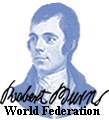|
The
following article appeared in "The Observer" following the 2
day symposium held at Strathclyde University, Glasgow.
Rabbie without
a cause?
Did Robert Burns lose his radical edge? A furious row has broken out between
academic rivals over what belongs in the canon of the Immortal Memory.
Arnold Kemp
Sunday January 20, 2002
The Observer
When literary scholar Dr Andrew Noble arrived the other day at Glasgow's
bus station, he noticed a poster featuring Robert Burns, whose name will
be celebrated this week all over the world.
What struck him was that the Burns in the poster was not the man from
the rather effete standard image of the Naysmith portrait. He bore a strong
resemblance to Elvis Presley, complete with sideburns and hint of a sultry
leer. The poster was even headed 'Rock and Roll'.
Burns, who has a worldwide following, is an important asset for the Scottish
tourist industry and the poster advertised the heritage park at his birthplace
of Alloway in Ayrshire.
But by exploiting the iconic potency of Burns and the sexuality that drove
his life and work, it exemplified one of the few themes that united scholars
gathered at the University of Strathclyde last week for a major symposium
on the poet. They were in accord that in an age of sexual frankness there
was no longer any need to sanitise the image of Burns, who has been described
as an 'eroto-maniac'.
Behind the dispassionate scholarly inquiry at the conference raged a bitter
row about a new edition of the poet's work. The Canongate Burns contains
poems attributed to him which, say the editors, show that he continued
to produce radical but anonymous work after 1793, when he is said to have
suspended his attacks on the establishment for fear of losing his job
as an excise officer in Dumfries. He died three years later.
The row, involving three former colleagues, has become increasingly bitter.
There have been allegations of smear campaigns and anonymous calls to
newspapers. But behind it lies a bid to restore Burns - traduced, sentimentalised
and ghettoised - to his position as one of the greatest poets of his age
and a radical who never truly recanted.
The controversy began in the 1990s when history graduate Patrick Scott
Hogg, long fascinated by Burns and his egalitarian values, began to research
poems in the contemporary radical press. He knew that Burns had promised
to send contributions to newspapers in Edinburgh and London. Unknown to
him, American scholar Lucylle Werkmeister had already published an essay
in 1961 identifying some of the poems he sent to London newspapers.
Hogg found a number of poems that seemed to fit the bill, putting about
15 on an 'A list' and 10 on a 'B list'. BBC Scotland heard of them and
asked Hogg to go public in a programme to mark the 1996 bicentenary of
Burns's death, called Ploughboy of the Western World .
He insisted on two academic referees. He asked for Noble, senior lecturer
in English at Strathclyde; the BBC insisted on James Mackay, a biographer
of Burns whose collected edition of his poems and songs is the standard
work on offer on the official Burns website.
Mackay said last week he had been asked at short notice by the BBC to
examine what he was told were 'manuscripts' of lost poems. He was excited,
but then found that the poems were not manuscripts. They had been copied
by Hogg from the radical press of the day.
Mackay said he was 'taken aback' and expressed considerable scepticism.
At this point, he said, he did not know of Noble's involvement. He felt
the poems were 'not very good' and should not be foisted on Burns.
Hogg felt bruised by Mackay's 'put-down' which he felt was unnecessarily
scornful: 'He denounced me as a nobody from nowhere.' He believed Mackay
had underplayed the radical Burns.
Noble was enthusiastic and later helped Hogg to win a Leverhulme grant
to allow him to continue his work on the poems. But even Hogg admits that
what he did next was precipitate. In 1997 he published Robert Burns: The
Lost Poems (Clydeside Press). He told The Observer : 'One or two people
pissed on me. I didn't definitely attribute any of the poems - I provisionally
attributed them. But the book was written in anger. Four months after
it came out, after comments from academics I respected, I would happily
have junked the B-list altogether.'
As Noble and Hogg continued their researches, their most persistent critic
was Dr Gerard Carruthers of Glasgow University. He had been Noble's student
at Strathclyde and said he had been an 'inspirational' teacher.
Hogg said that Noble, Carruthers and himself had been working on a proposal
to publish an anthology of radical poetry of the 1790s. Hogg said: 'When
Gerry had a go at me in the press, that blew that book right out of the
water.'
In The Canongate Burns Noble and Hogg included 11 of the original A-list
poems which they believed, on stylistic and contextual grounds and the
balance of evidence, were by Burns.
Carruthers returned to the attack. He had already established from holograph
evidence that one poem on the A-list and one on the B-list were not by
Burns but by the radical poet Alexander Geddes, a Roman Catholic priest.
His review of The Canongate Burns for the Herald was not published in
full but turned into a news feature which questioned the reliability of
the entire collection. Noble and Hogg make little secret of the fact that
they feel betrayed by an old friend and colleague.
Carruthers reinforced his criticism last week. He contributed a paper
to the conference, faulting relatively minor textual points but casting
further doubts on the attributed poems (the text of his criticism is published
in the latest edition of the literary magazine Drouth ) and accusing Hogg
and Noble of being 'over-assertive' about the radical Burns. He believes
that of the 11 attributed poems in the collection 'probably some more'
will go.
He told The Observer: 'Things had to be said, because if I hadn't gone
public it might have been worse - if the Americans or, God help us, even
the English had come along and said that the standards at work here are
not good enough.'
The attributed poems were 'untried' and 'too much is claimed for them'.
The Canongate Burns had not amassed significant or convincing evidence,
he added. 'Patrick Hogg was very precipitate. I tried to be supportive
at the time - but up to a point.'
Carruthers emphasised that he had no quarrel with the political line of
the edition. 'I'm left-wing. I would want a more political Burns [than
appears in some biographies and commentaries]. My heart politically would
be with Noble and Hogg, all other things being equal.'
Heavily criticised in The Canongate Burns for his 'parasitic' use of James
Kinsley's 1968 Oxford edition of the songs and poems, Mackay said he found
the dispute 'depressing'. He had 'fulsomely' acknowledged his debt to
Kinsley and did not think the poems should have been included without
further research. But he continued: 'I applaud the energy and scholarship
that's gone into this work. I don't rule out the possibility that some
of the poems may be by Burns.'
Burns scholar Carol McGuirk, professor of English at Florida Atlantic
University, defended their inclusion. 'It's good for Burns scholarship
- otherwise successive editions will just repeat or rubber-stamp the earlier
ones,' she said.
She thought there was a convincing case for many of the poems and was
sympathetic to the thrust of The Canongate Burns . It argues that the
poet had not just written 'a few love songs' after 1793. Evidence of his
continuing creative and radical drive could be found in such late poems
as 'A Man's a Man for A' That', published anonymously in 1795.
McGuirk is working on Poet Burns, examining his influence on later poets.
She believes he has been undervalued in mainstream literary studies.
She first noted the phenomenon of Burns as a sexual icon during her postgraduate
research in Glasgow - even in Victorian images of Burns, the sideburns
were beginning to emerge. She drew attention to the resemblance with the
Presley cult in an essay.
Early biographers and commentators bowdlerised both Burns's life and work.
Mackay agrees that the poet's sexuality should be more fully acknowledged:
'We live in a more enlightened age.'
Noble and Hogg include his bawdy Merry Muses of Caledonia in their collection.
Hogg is now a landscape gardener but he and Noble have revived the idea
of an anthology of radical verses.
In a paper to the conference, Noble said that Scotland needed to 'recover'
the radical Burns. He compared the 'protean Burns' to Mozart. In the genius
of both, he argued, the spirit was driven by the flesh. He believes Scotland
must recover Burns and his radical generation, whose importance was suppressed
after their deaths for political reasons.
Guardian Unlimited © Guardian Newspapers Limited 2002
|





